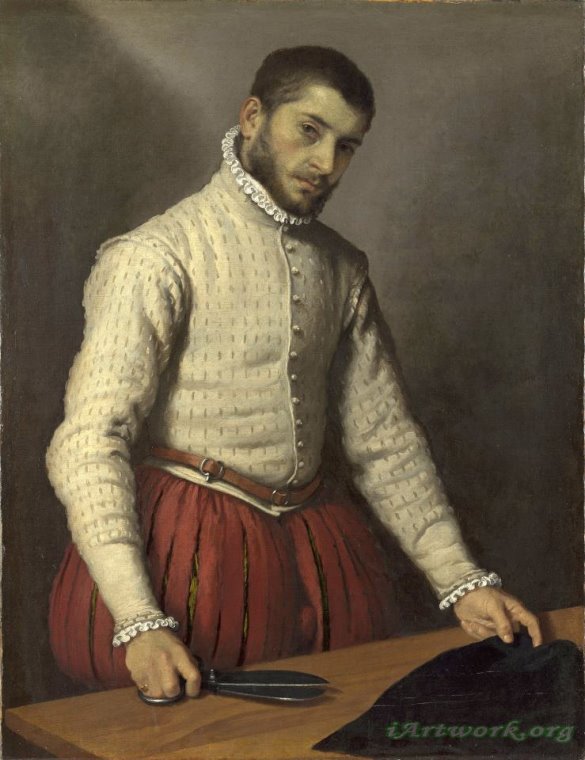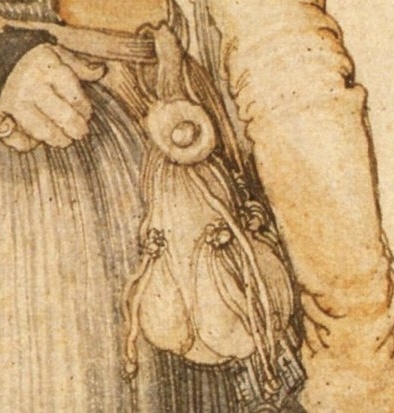By James Currie and Dr. Karen Wieland
Whatever to Wear?
If you’ve ever read any of Shakespeare’s plays, or even better – seen – a production of a Shakespeare play, you’ve probably heard about – or seen – a doublet. In the Renaissance, doublets were standard fashion of men – a short jacket, often padded or quilted, with long sleeve, that ended right at the top of their pants (or pant-like equivalents), as illustrated below:

But, if you’ve also read any of our previous posts, you know that this isn’t really a blog about historical fashion trends or articles of clothing. So yes, that is a picture of a man in a doublet, but we’re much more interested in lexical doublets.
Back to the Vocabulary
Linguistics, especially with respect to the etymology of Modern English, also has its own take on ‘the doublet,’ with not a button in sight.
The doublets we’re interested in are, per Merriam-Webster Dictionary, are “two or more words … in the same language derived by different routes of transmission from the same source.” What that means is: English is a sponge – it freely absorbs new words from any language in the world. Among all the borrowings and absorptions, English has borrowed the most from Latin. But our borrowings from Latin did not occur all at the same time or via the same route. Some come to us indirectly, via a Romance language, most often French. Other words come more directly, occasionally via French or Italian, usually in connection to religion, business or the arts and sciences (and just like that, we’re back in the Renaissance!).
A Little Historical Linguistics
There have been a couple of linguistically critical historical events where large numbers of Latin words entered English.
The first event was the Norman Conquest of Britain in 1066. The Normans were led by William the Conqueror, who, at the time, was the Duke of Normandy, in northwest France. When William and party arrived in Britain, they didn’t speak Old English/Anglo-Saxon. They spoke Old French, an intermediary Romance Language between Vulgar Latin and (Modern) French. The grammar and lexicon of Old French was predominantly Latin. Enter the first ave of Latin words into English.
The second event was that Renaissance we can’t seem to avoid in this post. The word ‘renaissance’ means ‘born again’ or ‘rebirth’ and comes from the Italian word ‘renascita”, via, surprise!, French. Originating in Italy (and quickly spreading throughout Europe), the Renaissance was truly a rebirth of European civilization from out of the Middle Ages.
Culturally, there was an effort to revive and surpass the ideas and achievements of classical antiquity. There was an emphasis on education based on classical Greek and Roman sources. It resulted in great social changes in art, architecture, politics, literature, exploration and science.
Bulging Budgets, From a Little French Pouch
It’s time for an example of a doublet that demonstrates everything we’ve talked about so far.
Our word “bulge” entered the language around the year 1200. Yes, we hear you, history buffs with calculators, shouting “That’s only 34 years after the Normans invaded! Correct. Bulge is a borrowing from the Norman and their Old French. In England in 1200, ‘bulge’ meant “a wallet” or “a leather bag.” The Old French word was “boulge” and came from Latin “bulga,” which also meant “leather sack”.

But nowadays, when we use the word “bulge,” we never mean “leather bag” or “wallet.” We mean “to swell” or “a swelling”. This is because the Latin word comes from an even older source, Proto-Indo European, where the original root *bhelgh-” meant to swell. The shift in meaning from wallet to swell happened around the year 1600.
But doublets come in pairs. So, if, in French – Old or Modern, you wanted to say “a little X”, or “a cute, little X”, you add the diminutive suffix -et/-ette. So our cute, little bouge becomes a bouget or a bougette.
And that’s why the best way to control bulging expenses is with a…”budget.” This doublet is first recorded in English in the early 15th century, which is squarely in the middle of the Renaissance.
More Examples to Come
Dr. Wieland and her tutoring students love to spot doublets in their reading and vocabulary work. In fact, they have already amassed a long list.
We will be pulling from that list for several more posts on doublets. We’ll also look at doublets from languages other than Latin (though, to be honest, those are few and far between). And if we’re lucky, we’ll even come across the occasional set of triplets – three different words from the same source word.
References
https://en.wikipedia.org/wiki/Renaissance. Retrieved on April 7, 2024.
https://en.wikipedia.org/wiki/Doublet_%28clothing%29. Image retrieved on April 7, 2024.
https://www.merriam-webster.com/dictionary/doublet. Retrieved on April 7, 2024.
Harper, Douglas (2021). Online Etymology Dictionary. Retrieved on April 7, 2024, from etymonline.com.